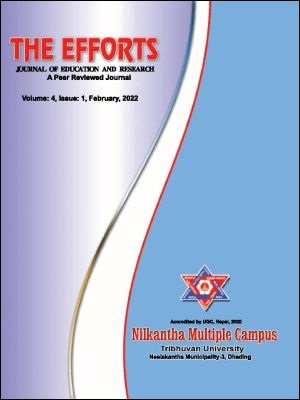Paradoxes Experienced in Embracing Inclusiveness among Students: Stories from Progressive Schools of Kathmandu Valley
DOI:
https://doi.org/10.3126/ejer.v4i1.44171Keywords:
culturally responsive, progressive schools, segregation, social inclusionAbstract
The discourse of inclusion in education is getting a great emphasis both in international and national arena these days. Talking especially about Nepal, with the rising voice for paradigmatic shift in education, the number of progressive schools is increasing which are in rigor of preparing a more democratic learning environment for teaching learning. However, since the discourse of inclusion in education demands addressing different needs of learners, inclusion meant to one might not be so for another. Hence, this paper aims at unraveling paradoxes the school leaders have experienced in course of practising inclusion among students. In this course, two school leaders from two different institutional progressive schools were selected purposively as research participants while Kathmandu valley was selected as research site. The study embraced narrative inquiry as research methodology whereas interview was used as method of data collection. Focusing basically on the areas of integrating cultural diversity and learning abilities of students, data were collected from the participants in the form of narratives for which open ended questions were used. From the study, it was revealed that inclusion tended to create in one way might result in exclusion in the other way. The basic paradoxes the school leaders narrated were regarding how to preserve and celebrate cultural sensitivity of each group in class and how to address students with different learning abilities without making them feel segregated in any way. Moreover, it even provided me an insight that inclusion in education has to be understood in contextual manner rather than generalizing it based on what the state says or how state defines.
Downloads
Downloads
Published
How to Cite
Issue
Section
License
All rights reserved. No part of this journal may be reproduced in any form or by any electronic means, including information storage and retrieval system, without prior permission from the publisher.




